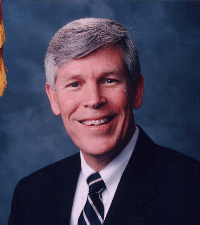
Senator Connie Mack
Joint Economic Committee
Chairman's Opening Remarks
![[audio]](/images/speaker.gif) .au file (22 Mb) /
.gsm file (4 Mb) /
.ra file (2 Mb).
.au file (22 Mb) /
.gsm file (4 Mb) /
.ra file (2 Mb).

![[audio]](/images/speaker.gif) .au file (22 Mb) /
.gsm file (4 Mb) /
.ra file (2 Mb).
.au file (22 Mb) /
.gsm file (4 Mb) /
.ra file (2 Mb).
Good morning and welcome to this "first of its kind" 21st Century hearing on the 21st Century economy.
America and the world are embarking on a journey into a new age of human endeavor and achievement. This era will experience tremendous change in every aspect of our lives. We are already witnessing unparalleled change in the global economy, in technology and communications, in business and industry, and in communities and families.
These changes mean that Industrial Age government is obsolete. Government in the Information Age must become dramatically smarter, smaller, and simpler. An Information Age government shouldn't just be more efficient in meeting Industrial objectives, as some propose. Instead, government must be redesigned and its policies reformed to maximize freedom for innovators and entrepreneurs, and to build new avenues for individual creativity and prosperity. If we can successfully redesign our government, especially its economic policies, then the new technologies of today and tomorrow will help create a world of unprecedented economic opportunity and prosperity for future generations.
Today, we will explore society's transition into this new era and focus on the role of government in the Information Age economy. Maybe the most fundamental and profound fact of the technological change we are witnessing is that the power of the compute chip now doubles every year and a half. That pace will get even faster. In the next ten years, micro chip power will increase by a million times. And the power of global computer networks increases geometrically as millions of new users are linked together every month.
What does that mean for government? It means a bureaucratic, heavy-handed, Industrial Age government can't hope to keep up. Today's government is trying to manage yesterday's economy. That is not only a waste of increasingly scare resources, it creates barriers to future growth and prosperity. Clearly, a government built on old notions of regulation and control cannot hope to survive, much less succeed in an environment of ever-expanding individual freedom in the Information Age.
Today's hearing is a modest example of how the technologies of the information revolution are changing American government. This is the first Congressional hearing to make full use of the interactive video conference technology. Seven out of ten witnesses are testifying from remote locations around the nation and abroad over an interactive audio/video network. We are being transcribed onto the Internet and invite the C-SPAN and on-line audience to submit questions to the Committee. Our e-mail address is jec@town.hall.org.
I'd especially like to note the locations of two of our witnesses: Paul Johnson is testifying from London, England and Congressman Bob Walker from Ephrata, Pennsylvania. I point these out to emphasize that the information revolution is already reaching ever corner of the globe, from the biggest cities to the smallest towns. As long as we avoid creating artificial barriers to the information transformation, no one will be left behind as we embark on this exciting journey into the Information Age.
I can foresee future hearing in which all the witnesses testify from their homes and all Americans will be able to participate. And we'll cut the costs of these hearings by half or more compared the to the traditional way. For example,we've cut the cost of today's hearing in half by using interactive technology rather than bringing everyone to the nation's capital.
I would now like to welcome the witnesses on our first panel, Alvin Toffler here in Washington, Joel Kotkin in Los Angeles, and Paul Johnson in London. Thank you for joining us.